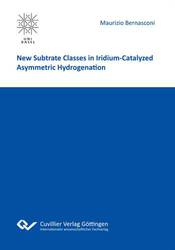| Fachbereiche | |
|---|---|
| Buchreihen (96) |
1381
|
| Nachhaltigkeit |
3
|
| Gesundheitswesen |
1
|
| Geisteswissenschaften |
2370
|
| Naturwissenschaften |
5408
|
| Mathematik | 229 |
| Informatik | 319 |
| Physik | 980 |
| Chemie | 1364 |
| Geowissenschaften | 131 |
| Humanmedizin | 243 |
| Zahn-, Mund- und Kieferheilkunde | 10 |
| Veterinärmedizin | 108 |
| Pharmazie | 147 |
| Biologie | 835 |
| Biochemie, Molekularbiologie, Gentechnologie | 121 |
| Biophysik | 25 |
| Ernährungs- und Haushaltswissenschaften | 45 |
| Land- und Agrarwissenschaften | 1005 |
| Forstwissenschaften | 201 |
| Gartenbauwissenschaft | 20 |
| Umweltforschung, Ökologie und Landespflege | 148 |
| Ingenieurwissenschaften |
1795
|
| Allgemein |
98
|
|
Leitlinien Unfallchirurgie
5. Auflage bestellen |
|
Erweiterte Suche
New Subtrate Classes in Iridium-Catalyzed Asymmetric Hydrogenation
Maurizio Bernasconi (Autor)Vorschau
Leseprobe, PDF (270 KB)
Inhaltsverzeichnis, PDF (92 KB)
The main aim of the research presented in this thesis was to expand the substrate scope of the iridium-catalyzed asymmetric hydrogenation, which represents an extremely useful methodology for the enantioselective synthesis of chiral molecules.While this chemistry has been developed and investigated mainly for the hydrogenation of unfunctionalized olefins, so far only little attention has been given to functionalized olefins. Therefore, the different research projects presented in this thesis dealt with the application of iridium catalysts to the reduction of particularly valuable substrates that are difficult to hydrogenate enantioselectively with other methods.
The first chapter of this thesis gives a general introduction on asymmetric hydrogenation and the role of iridium catalysts in this context. The following two chapters deal with the investigation of new substrates in the iridium-catalyzed asymmetric hydrogenation using various N,Pligands developed in the Pfaltz group,and give an account of the superior results that have been obtained with such catalysts compared to thoserepresenting the state-of-the-art. In particular, chapter twoconcerns the reduction of vinylsilanes, for which the judicious choice of the best catalyst for each specific substrate was required to achieve good results in term of both chemical and optical yield. On the contrary, a pyridinyl phosphitine bearing a 2,6-difluorophenyl group on the oxazoline ringwas best suited for a broad array of 2-alkyl- and aryl- substituted maleic acid dimethyldiester, as reported in chapter three. Such process turned out to be enantioconvergent, allowing the hydrogenation of mixtures of maleates and fumarates in high enantiomeric excesses.
In chapter fourthe deployment of environmentally friendly solvents such as THF and 2-MeTHF in the iridium-catalyzed asymmetric hydrogenation of 3,3-disubstituted allylic alcohols is described. Finally, chapter five of this dissertation deals with the development of new NHC ligands for the iridium-catalyzed asymmetric hydrogenation of acid-labile substrates such as tert-butyloxycarbonyl protected allylic alcohols. Experimental details and characterization of the substances discussed in the main body of this manuscript is reported in the experimental section that constitutes chapter six.
| ISBN-13 (Printausgabe) | 9783954046157 |
| ISBN-13 (E-Book) | 9783736946156 |
| Buchendformat | A5 |
| Sprache | Englisch |
| Seitenanzahl | 178 |
| Umschlagkaschierung | glänzend |
| Auflage | 1. Aufl. |
| Erscheinungsort | Göttingen |
| Promotionsort | Basel |
| Erscheinungsdatum | 30.01.2014 |
| Allgemeine Einordnung | Dissertation |
| Fachbereiche |
Chemie
|
| Schlagwörter | Iridium, Hydrogenation, Catalysis, Organische Chemie |








